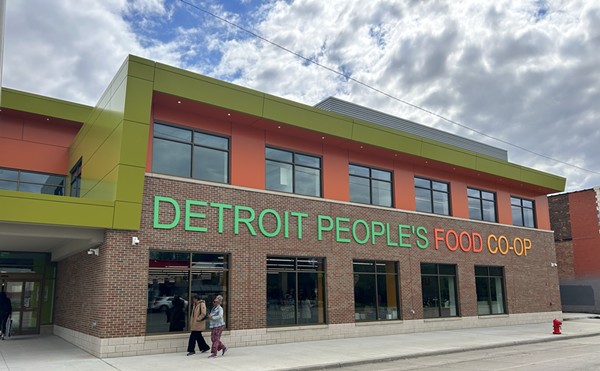I want you young people to know that the city you’re growing up in today is not worthy of you. Somehow, we’ve lost our way as a society and as a community. [Yet] we’re all in this together and we can turn this thing around.
—Freman Hendrix, announcing his candidacy for mayor
They don’t make many cars in Detroit anymore, and nearly half of those who live in the city can’t afford one anyway. That might shock most of the glitterati now flocking into town for the North American International Auto Show.
But then, the vast majority of them won’t go anywhere near the city’s neighborhoods, where the streets are poorly lit, something that may not be all bad, given the condition of many of the buildings. There’s no modern mass transit, unemployment is at double-digit levels and hope is in short supply.
Freman Hendrix knows all this, and wants to be mayor of this place anyway. He’s traded in a high-paying job and two years of his life to chase that goal, with absolutely no guarantee of success. Several hundred people filled Marygrove College’s auditorium to overflowing Sunday to hear him say why.
“We are making a clear statement — we believe in the future of Detroit,” he said. “But let’s face it. Our city is in trouble, more trouble than any of us could have imagined would be possible just three short years ago.”
Hendrix was deputy mayor, and essentially chief operating officer, in the glory years of the Archer administration, when the city seemed to be on the way back. Throughout those years, he was essentially the man who got it done, who corralled the parties behind the scenes, got some folks to reason together, knocked heads together, and torpedoed opponents when he had to.
Four years ago, when he got tired of waiting for Dennis Archer to decide whether to run for a third term, he left government, became chief operating officer of a company called Strategic Staffing Solutions, and started making real money. He has a beautiful wife and two stunning college-age children, who introduced their father to an enthusiastic crowd. (The contrast between Erin and Stephen Hendrix and the giggling Bush twits last summer could convince a Klansman of the inherent inferiority of the white race.)
This is a man who knows how to get it done, but who the smart money says doesn’t have a chance. Kwame Kilpatrick has oceans of cash; Sharon McPhail and Benny Napoleon are charismatic speakers and far better known. Freman Hendrix, say those who follow politics closely, is doomed.
What’s puzzling is that Hendrix would seem to be the ideal candidate. He’s 54, handsome, appealing and has the sort of résumé that would qualify him as a candidate for the U.S. Senate. Born into a solid working-class family in Inkster, he enlisted in the Navy during the Vietnam War, did well there, got a business degree from Eastern Michigan University and worked his way up in the finance departments of Detroit and Wayne County government.
He got his start in politics working in local neighborhood associations in Northwest Detroit, remarkably managed to bring Little League baseball back and is a churchgoing Roman Catholic and devoted family man.
Perhaps most importantly, he doesn’t seem to have a chip on his shoulder, a desire to get his hands in the cookie jar or a need to prove anything to himself. His big weakness is that he has never been elected to anything. Long ago, he rashly got into a county commission race and was stomped.
Yet he’s not the typical behind-the-scenes bureaucrat; though he isn’t a spellbinding speaker, he can hold his own. And what he does have, other than ability, is a deeply thought-out, comprehensive and honest assessment of the city’s problems and possibilities, which he calls “Roadmap to Detroit’s Future.”
Twelve years ago, Archer got a lot of good press for his plan. Hendrix’s is considerably better. He held, literally, hundreds of meetings in residents’ homes to find out what was on their minds. The first, and largest, section is called, “Getting Our Neighborhoods in Gear.”
In the plan, portions of which are posted on his Web site (fremanhendrix.com), he also addresses economic development in startling, free-market terms, calling on the city to eliminate barriers to new investment and dropping its ridiculous rule that all property be sold at market value.
Though he’s a Democrat, he knows Washington isn’t coughing up billions anytime soon. Instead, he calls for public-private partnerships to “face economic reality and provide a viable means to getting local residents without vehicles to jobs in the suburbs,” mainly by building a light rail system.
Additionally, he would restructure the city charter to elect seven of the nine councilmen by district, largely, he says, to make city office accessible to “bright, energetic Detroiters with good ideas and solid experience, but without a lot of money or extensive political connections.”
Trouble is, most voters won’t ever read his plan. How, I asked him last week, did he expect to overcome his rivals’ name recognition. He laughed. “You guys in the media will do that for me.” That is, we will if we cover what is honestly going on, and spend some time assessing who would do what for the city.
What was clear to me is that while ambitious, Freman Hendrix feels compelled to run because he honestly believes that Kwame Kilpatrick is a “bad man,” an immature thug who is bringing the city down and whose only agenda is himself. Nor does he believe that Sharon McPhail has the tools.
Hendrix has a “broken window theory” of cities; he thinks people are shaped by what they see around them. If that’s largely broken windows and burned-out houses, they’re more likely to give in to socially destructive behavior. On the other hand, “small improvements in the look or feel of a neighborhood can have a major, positive impact on what actually goes on there.”
Makes sense to me. But can he reach enough voters? His primary appeal is to the rational and the college-educated, and though his campaign theme last night was the Black Eyed Peas’ “Let’s Get It Started In Here,” everything about him and his campaign is clearly more Brubeck than hip hop.
Yet I did see the reaction when he talked, without naming names, of the “top city official that was stopped for a traffic violation, and said to the police officer, ‘Don’t you know who I am?’” And I saw people nod their heads when he proclaimed that the city needed a mayor who led by example, and spent more time in the neighborhoods than “jetting around the country.” Maybe, just maybe, we could all be in for a surprise.
Speaking of broken windows: Four years ago, Harriet Saperstein, who runs HP Devco, Highland Park’s economic development agency, told me that, as bad as things were, whoever was responsible for the elegant but long-vacant former Ford Motor Co. administration building on Woodward Avenue immediately replaced any broken or cracked windows.
Otherwise, buildings fall prey to weather or arson, and deteriorate very swiftly. But over the last few weeks, several large windows of the Highland Park building first developed holes, and now entire panes of glass are missing. This is a legendary part of our history, and the owner seems to be advertising for an arsonist. Why?
Jack Lessenberry opines weekly for Metro Times. Send comments to [email protected]




